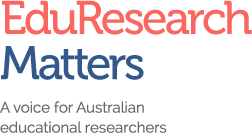This is the third day in our series of posts on AARE’s education priorities for the 2025 federal election. Today’s posts are about research-informed policy.
If you regularly read the news, you can be forgiven for thinking these are far from halcyon days for Australian universities. Their relationships with governments and public appear increasingly fraught. Few people are happy with them: not their students, not governments and not their own staff. There are lots of opinions about what it is that these institutions should and should not do. If there is one thing that seems to unite both major political parties, it is that something needs to be done about university governance, quality of education and the number of international students enrolled each year.
That Australian universities are subject to so much criticism can seem puzzling when looking from afar. It is hard to escape the fact that the country’s universities are in robust shape compared to many places around the world. It is not hype to say Australia has one of the better higher education systems around. Most students have been consistently happy with the quality of education as measured by the national Student Experience Survey. Many staff working in universities are remunerated highly compared with their peers internationally. On a per capita basis, Australia performs well in terms of the quantity and quality of the research.
Longstanding and significant issues
While some of the complaints about universities are probably misplaced and outside observers are right to point to many successes, there are also longstanging and significant issues that both sides of politics will need to address sooner or later if Australia is to continue to have healthy universities.
Domestic students are paying more and student debt is a problem. The previous government’s policy to increase the cost of humanities, communications and human movement degrees is starting to bite. Combine the cost of an undergrad Arts degree and a professional master’s qualification, such as in Law, and high debts become the norm rather than an outlier. The days of $100,000 HELP debts are well and truly here. The problem for any future government is that this is a very expensive problem to fix when there are many calls on the federal budget.
A tough ask
A straight reversal of the Job-ready Graduates changes that increased fees would be north of one billion dollars a year, every year, from now on. The last time we had such a large single year increase in student funding was at the height of the demand driven system in 2011-12, when universities could enrol as many students as they liked. In inflation adjusted dollars there was a similar sized increase in funding in 2011-12 that brought around 50,000 extra students into the system. Reversing the Job-ready Graduates policies would bring in no new students for roughly the same cost to the public purse. A tough ask for any government is an issue the recent Universities Accord did not offer a full answer to solve.
It is not just student debt that is an issue hard to fix but also hard to continue ignoring. Australian universities do a large proportion of the country’s research. As a proportion of GDP in recent years, spend on research in higher education institutions has been second only to Canada of our major peer countries. Yet the majority of these funds do not come from public grants or research contracts, they are from what are often termed ‘general university funds’, which usually means funds from international student revenue.
A virtuous circle
For a long time, many people have argued this was a ‘virtuous circle’ where universities invested in research with the fee income from international students, which led to better international rankings, which in turn attracted international students, which funded more research. This bounty did not just go towards research: it also helped replace capital stock and facilities, support programs and generally ‘grow the pie’. But to argue this is sustainable in the long term is optimistic at best. As Covid showed, the fortunes of international education can change fast.
Which is all part of the reason many universities are nervous about where policies to cap international education might lead. Australia has had fee-paying international students for many decades, though their numbers remained small until recently. One in twenty enrolments in the late 1980s was an international student. Within two decades, one in four students in Australian higher education was an ‘overseas student’ as they were once called. At its peak a decade later, one in three, making the country one of the most internationalised in the world in terms of its student make-up. Capping international student numbers at current levels might be sustainable, assuming that demand holds over the longer term.
Safe and sunny
Viewed as safe and sunny, Australia has benefitted from being an English-speaking nation with a high-quality education system in the neighbourhood of many Asian countries where international study is popular. At times there has been the added incentive of generous post-study immigration policies. If Australia seeks to send signals that we do not welcome students or our education quality is seen to be slipping, the future might not be so sunny. The major source countries of China and India are building their domestic systems. China has invested vast sums in educating its population.
No matter who forms government after May 3, these issues – student debt, sustainable research funding and setting for international education are only going to become more fraught. There might be a lot of misplaced complaints about universities, but there are real policy issues that are going to require attention.

Gwilym Croucher is associate professor and the deputy director of the Centre for the Study of Higher Education at the University of Melbourne.






